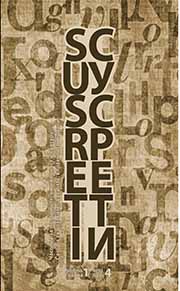
We kindly inform you that, as long as the subject affiliation of our 300.000+ articles is in progress, you might get unsufficient or no results on your third level or second level search. In this case, please broaden your search criteria.

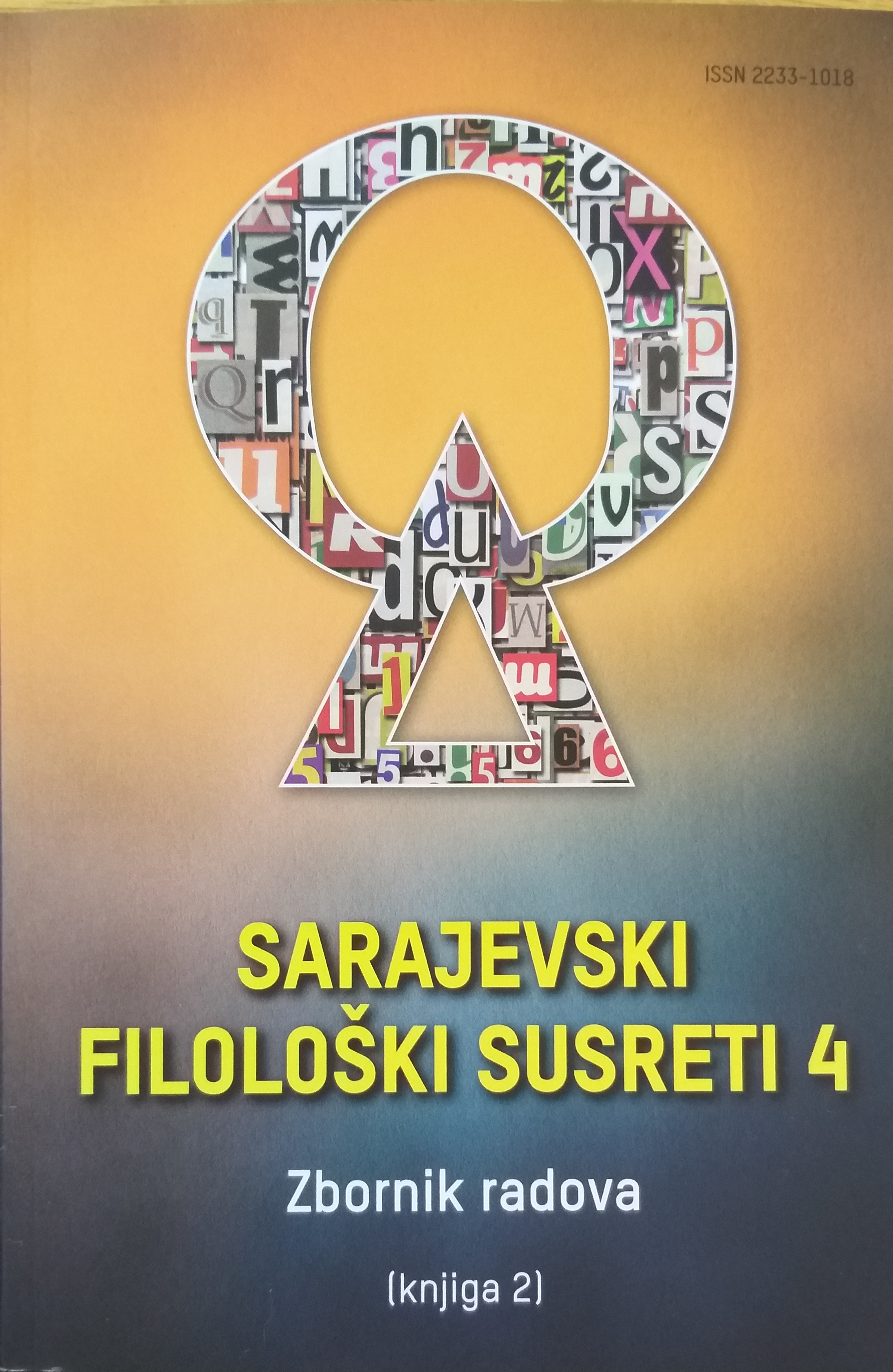
Comparative analysis of the of the contemporary Slovene short prose awarded by the fable for the best short story collection, reveal some fundamental characteristics: the prevailing minimalism, from the perspective of the literary style, which is revealed through e.g. the dialogue discourse, mimetic speech with all linguistic specialties, short connections in communication between the characters and theming the subject’s identity crisis, interculturalism, intertwining of the rural and urban; the typology of the contemporary Slovene short prose is reaching new spheres (for example – Andrej Blatnik: Zakon želje, 2000).
More...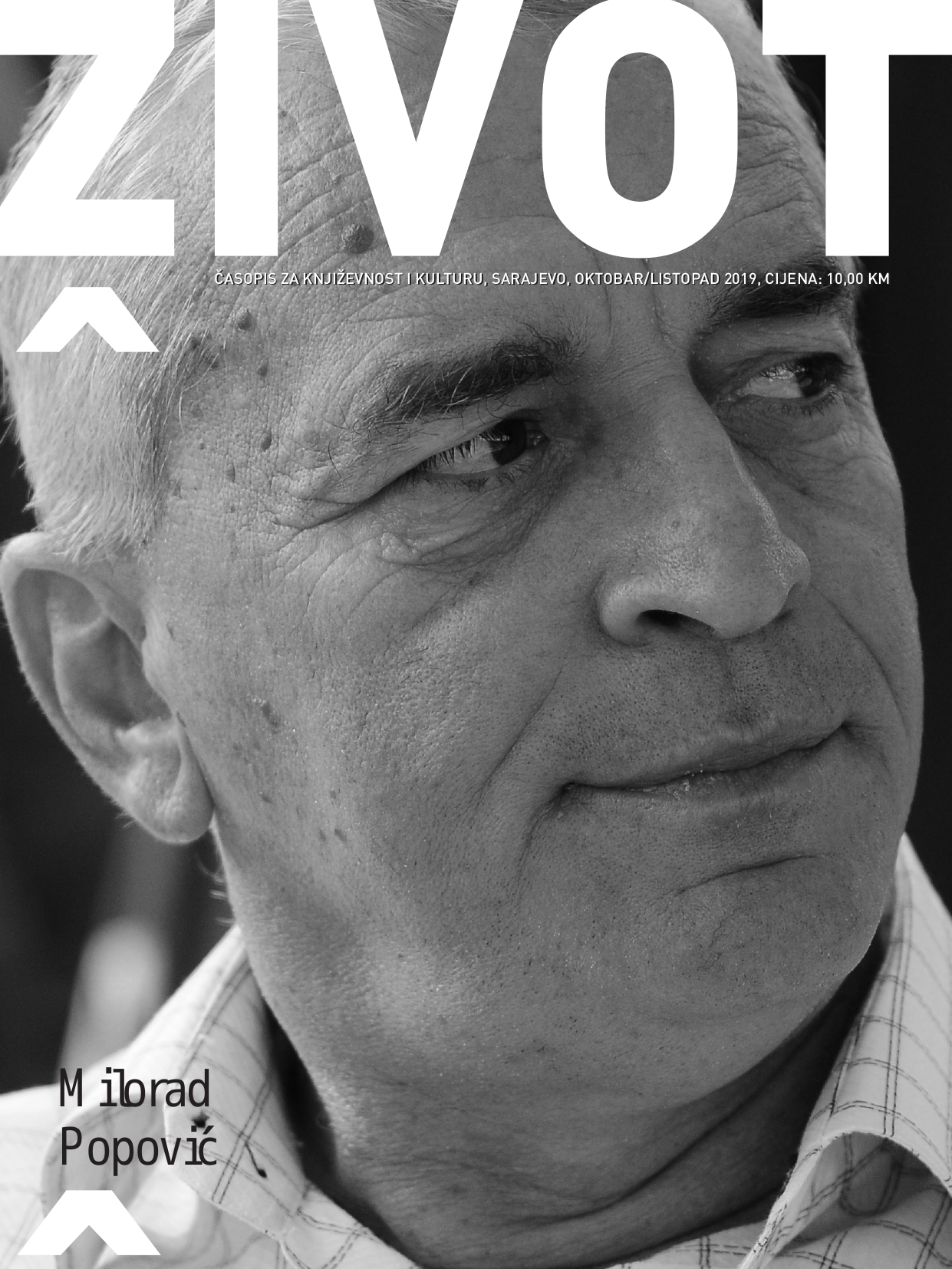
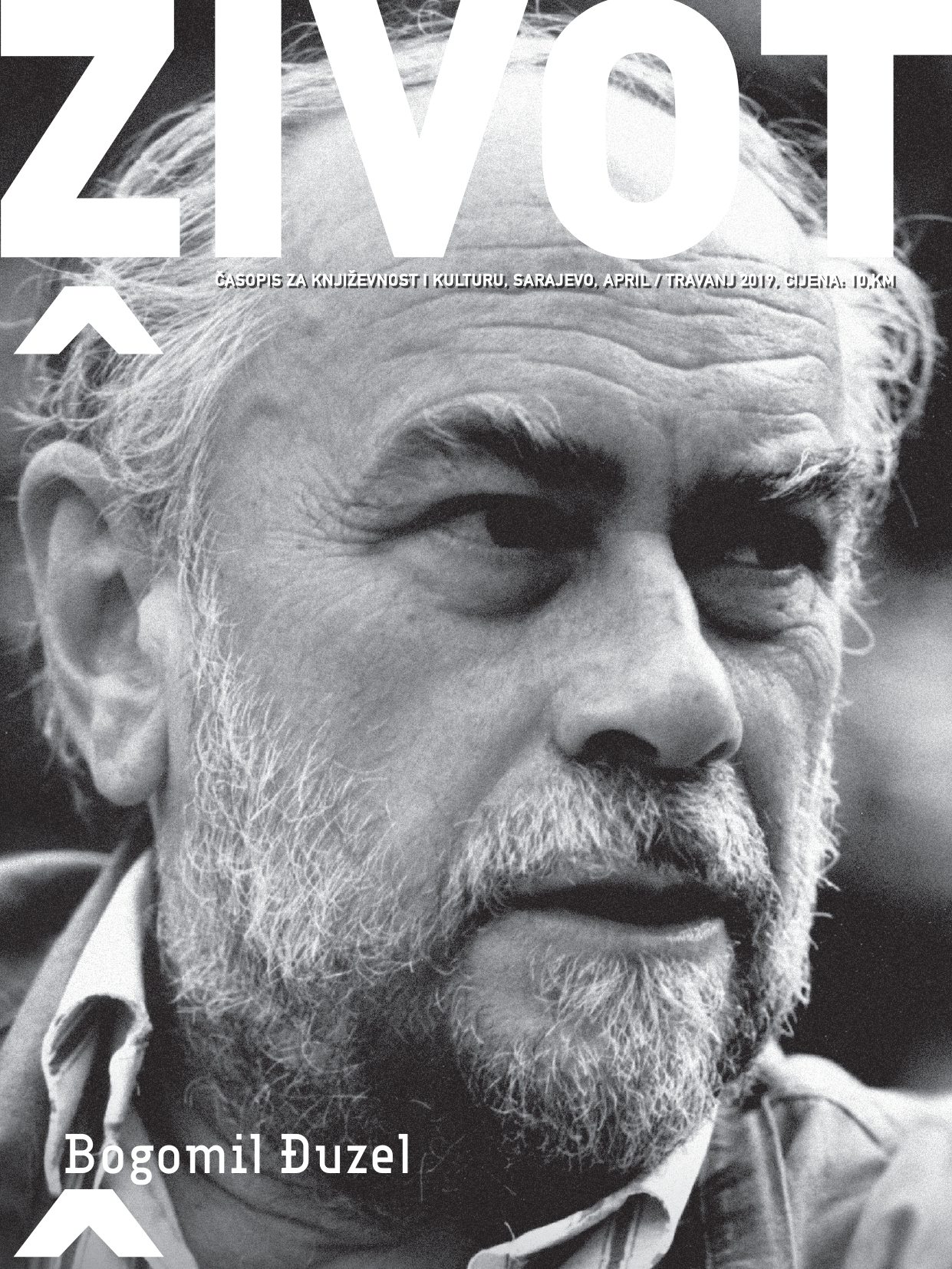







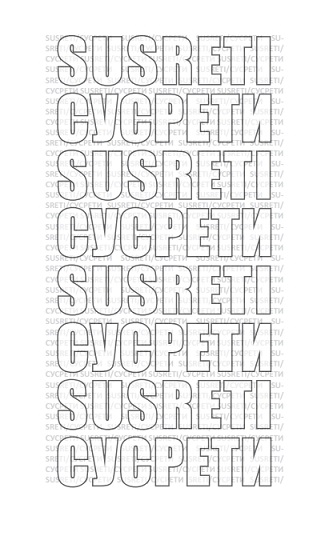
Drama “Cijeli život” napisana je 2007. godine i bila izvođena u koprodukciji KUD Intergali, Gledališča Glej i Mestnega gledališča Ljubljana.
More...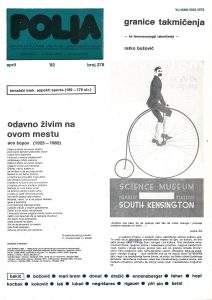
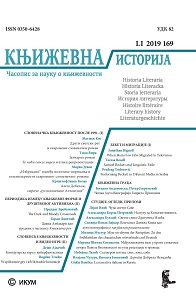
The creativity of Aleš Debeljak, a prominent Slovenian poet, sensitive essayist and public intellectual, can be divided into three parts: deeply personal poetry, professional or scholarly work, and socio-political essays or commentaries. These three parts, although different from one another, are loosely linked together by the trigger of Debeljak's creativity: the individual's responsibility to society and fellow human beings. Debeljak's essays are especially memorable since they are mostly related to the space that defined him from his childhood, i.e. Yugoslavia, but above all to its terrible devolution. The article explores three of Debeljak's texts: Twilight of the Idols, Balkan Footpath and How to Become a Human Being and its aim is to examine the occurrence of the topic of Yugoslavia in them. The three selected texts have been written over a period of twenty years and all three reveal Debeljak's unbearable pain caused by the collapse of the multicultural, culturally rich community that offered the foundation for the creation of his own version of identity, which he proudly called cosmopolitan. Debeljak transferred his identity from the national plain to the cultural one – cultures that offered him immeasurable freedom and wealth became the existential provision that defined his essence. Twilight of the Idols is undoubtedly Debeljak's darkest essay on the new state of the world, which he called his ”own”. Originally published in 1994, when the bloody armed conflicts in the former republic of Yugoslavia were in full swing, this essay was among the very rare voices in the former homeland which lamented its collapse. Debeljak was well aware of the devastating power of nationalisms that dominated this area and thus destroyed the delicate tissue of cultures. The second book, Balkan Footpath, was published in 2010, that is a decade and a half after the end of the conflict, but still revealed Debeljak's profound sorrow. In it, Debeljak pays tribute to all those writers of the former common homeland who inspired him on the path of shaping his own identity, such as Ivo Andrić, Meša Selimović, David Albahari, Muharem Bazdulj, also Charles Simic, but his main attention goes to the two great Serbian authors, Miloš Crnjanski and Danilo Kiš. With the last of the selected books, How to Become a Human Being, Debeljak returned to his earliest years in the last decade of Yugoslavia's existence. In his comments, Debeljak follows the intimate memories from his childhood and early teens, describes events and experiences that have affected him, many of which are linked to Yugoslavia.
More...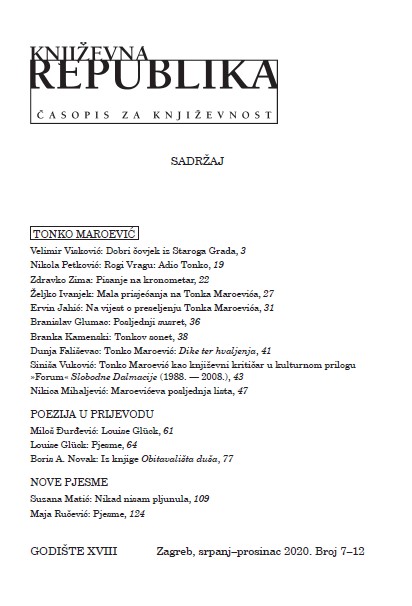
Collection of poetry by Boris A. Novak ("Residencies of Souls", Volume 6)
More...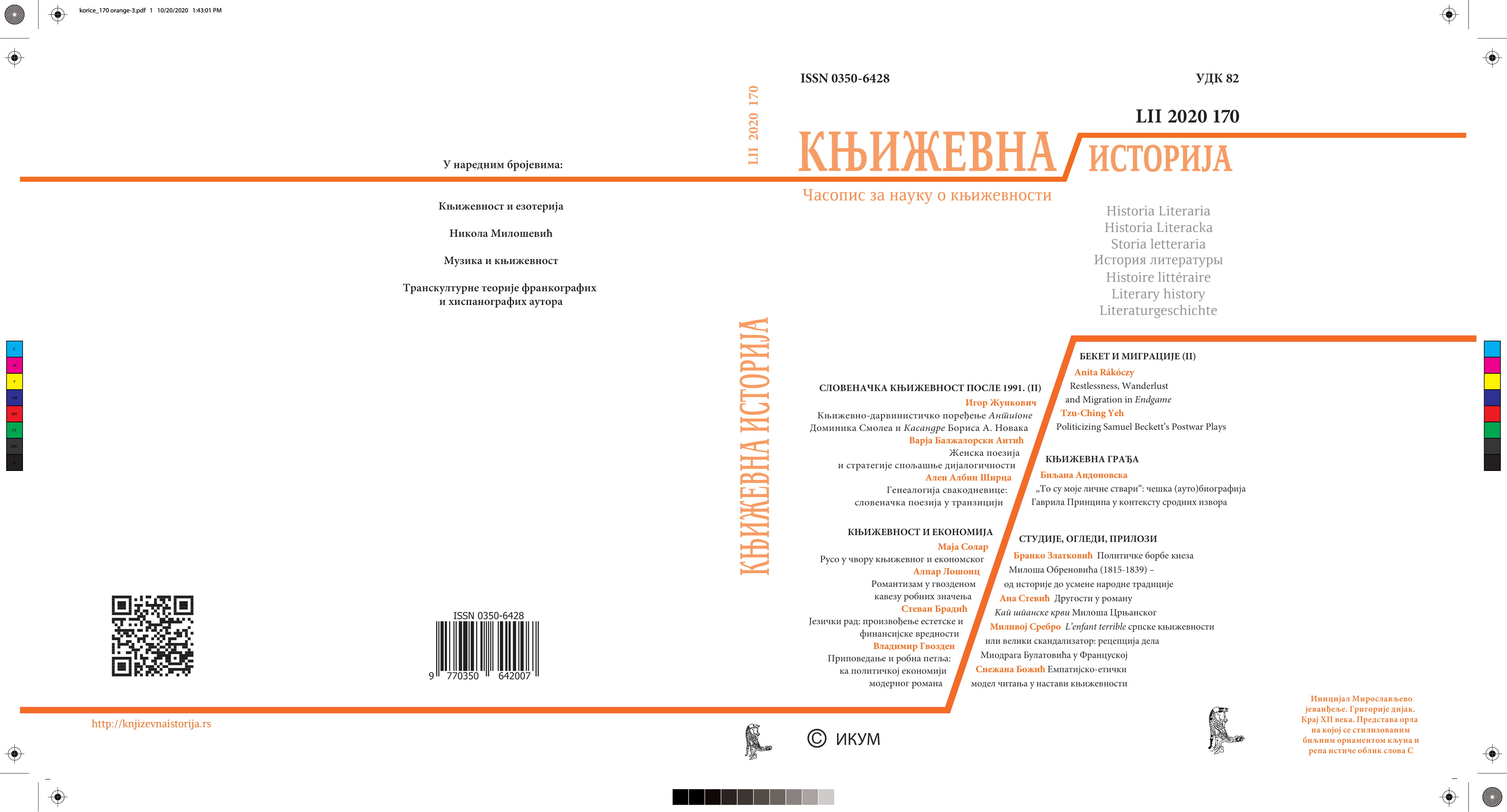
This article deals with Slovenian poetry written by women in the last two decades and focuses in particular on the use of so-called external dialogism. In the introductory section, I present a brief outline of the historical position of women poets in the Slovenian literary system along with structural changes that have occurred since 2000. Although these changes have had a positive influence on both poetic production by women and on its overall reception, statistical data reveals that the Slovenian literary field remains largely phallocentric. In the second section, we analyse recent women’s poetry published in Slovenia, finding in it many of the female attitudes toward the patriarchal symbolic order identified by Julia Kristeva: namely, accommodation and appropriation, and subversion through an exploration of its constitutive mechanisms. At the same time, we argue that all phases in the development of women’s writing defined in Elaine Showalter’s gynocritic are present in contemporary Slovenian women’s poetry: protest, imitation and accommodation, self-discovery and self-exploration. Although Saša Vegri was one of the first to begin this emancipatory process in late 1960, radical critiques of the symbolic order appearing in women’s poetry were rare and sporadic, and the majority of women poets in subsequent generations drew upon the same patrilinear tradition at the beginning of their poetic careers. In the generation of women poets born around 1970, the emancipatory approach was followed most systematically in Taja Kramberger’s poetry, and in the next decade in the work of Alenka Jovanovski and Ana Makuc. Female authors of the 1960 generation, Barbara Korun and Maja Vidmar, also increasingly stepped out of the accommodational mechanisms of patriarchal structures and began to investigate the neuralgic points of the symbolic in a more daring manner. Authors confronting patriarchally-formed mental, socio-cultural, and enunciative patterns generally use two strategies in reconstructing their own discursivity: the concept of the fictive persona, and the dramatic monologue. We provide a brief historical outline of these poetic techniques, incorporating both in so-called external dialogism, a category drawn from Bakhtin’s typology of dialogic relations in prose fiction and transposed onto lyric discourse. In the rest of the paper, we analyse poetry collections by Taja Kramberger, Katja Gorečan, Barbara Pogačnik, Barbara Korun, Ana Makuc, and Maja Vidmar. The theoretic framework for the analysis is a reconceptualized view of the lyrical subject, using concepts such as focalization in the analysis of the lyric. The article comes to the conclusion that the persona poem and the dramatic monologue are principle strategies used to explore the intimate and social habitus that had so long been maintained in silence, the very gesture of acquiring voice undertaken by hitherto “fragile” subjects – women, animals and even plants – endowed with the symbolic value of the subversive and transformative impulse.
More...
The article attempts to detect and describe the change of the paradigm in contemporary Slovene poetry. If most of the Slovene poetry after the Second World War, or to be more precise, from the late 1950s onwards, was written in the modernist key, with the “serious” existential themes and often dark and hermetic speech as prominent features, we may assume that in the 1980s this kind of poetry was slowly beginning to disintegrate. Although in this decade the so-called neo-avant-garde (or ultramodernist) poetry, which surfaced in the 1960s, became almost obsolete, the poetry of Tomaž Šalamun, the leading voice of the Slovene neo-avant-garde poetry, functioned as some sort of the major catalyst for the new poetry. If we may borrow the distinction between the “cooked” and “raw poetry”, first used by Robert Lowell with regard to the new American poetry of the 1950s and 1960s, we can detect such new poetological tendencies that focus on the mundane themes of the everyday urban life, often written in a spontaneous and sometimes colloquial language, free of formal and metaphysical maneuvers of the so-called “academic”, “cooked”, or “moderate” modernism. To illuminate this poetological transition, the article focuses on the year 1991, which coincides with the disintegration of Yugoslavia and the formation of Slovenia as a new national state. In this year, many of the new young poets started their poetical careers. The brief analysis of the poetical debuts of the poets such as Brane Senegačnik, Vid Snoj, Miklavž Komelj, Jurij Hudolin, Peter Semolič, and Uroš Zupan attempts to demonstrate that most of the poets are still indebted to the modernist paradigm (with Dane Zajc and Niko Grafenauer as its main representatives), but nonetheless, in some cases, the traces of the new, “cooked” urban and narrative poetry can be observed on the margins of these debuts. These elements, however, are the most prominent in the book Sutre, written by Uroš Zupan, who also happens to be most influenced by the poetry of Tomaž Šalmun on the one hand and the American poetry of the beat generation and New York School on the other. These influences were of the utmost importance in the first stage of the new poetic paradigm that at the beginning of the 1990s strove to overcome the modernist literary tradition. The poetry of Uroš Zupan thus paved the way for the new mainstream of the contemporary Slovene poetry that appeared in the new millennium.
More...
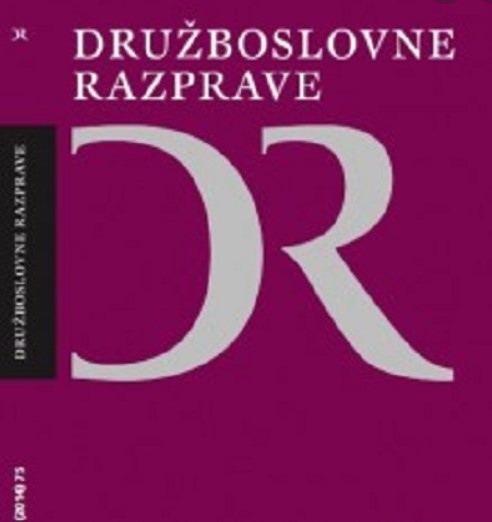
Lahko bi rekli: kakršen gospodar, takšen hlapec. Toda Cankarjevi Hlapci ne govorijo o hlapcih v realnem, temveč v moralnem pomenu. Gre predvsem za hlapčevstvo; a v času, ko smo na Slovenskem imeli hlapce še tudi zares: po kmetijah, gostilnah in podobno.
More...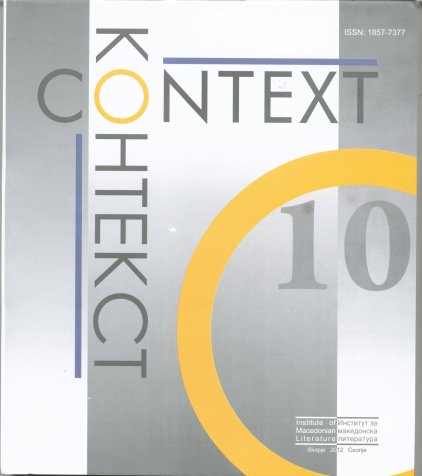
Macedonian and Slovene are two related languages that belong to the South Slavic family of languages. They have phonetic-phonological features that on one hand are similar, but on the other hand are different. This research will show the right image of the direction of their mutual developments. The main subject of this study is a comparative analysis of the phonetic system of both languages, with emphasis on phoneme /v/. Phoneme /v/ is the most complex phoneme in the Slovene spoken literary language, with the most allophones and normative deviations. On the other hand, in the Macedonian literary language this phoneme is an obstruent but the distribution features are specific according to the sonant character of /v/. The appearances that should be explored are the features of the consonant groups in both languages as well as their assimilative and dissimilative processes manifesting in the frames of these groups. In the usage of the standard language speech forms in different language areas, deviations from the normative form are attested in both languages (Macedonian and Slovene). Hence in Macedonian, the deviations from regular pronunciation of the vocals and of the right prosody are emphasized. While in Slovene there is a distinction in speech forms, especially of the sounds in some positions of the phoneme /v/. These remarks point out the need of making a solid analysis on the situations and regulations of the orthography norms that at the present time are missing from both languages.
More...